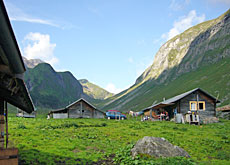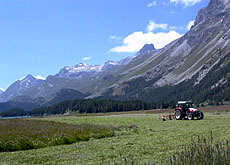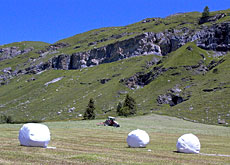Swiss slowly pack their bags and leave the Alps

Beyond the cliché of idyllic snow-capped peaks and the sound of cowbells, living and working in the Alps can be extremely tough and poorly paid.
As more and more Swiss decide to pack their bags and leave the mountains, foreigners are taking their place to look after and farm the picture-postcard alpine pastures.
The Oltscheren Alp in the Bernese Oberland rises like a fortress at the end of the valley.
Wooden farmers’ huts are dotted here and there. Cows graze between rockslides as if stuck to the mountains and water can be heard trickling downhill.
But in reality this spectacular alpine setting is becoming less and less attractive to the Swiss.
“The Swiss who grew up in the Alps now prefer the cities to the tough mountain life,” Jan Sonderegger, who runs the cheese dairy with his wife on the Oltscheren Alp, told swissinfo.
Sonderegger knows what he’s talking about. He has worked many long 18-hour days in his time as a mountain cheese maker.
A growing number of shepherds and herdsmen are also leaving prematurely, adds Sonderegger.
“People often have a wrong impression about life in the mountains,” notes the young man from St Gallen, who is dressed in white Wellington boots and a rubber apron.
Foreign mountain dwellers
In all, there are five Swiss still raising cattle, goats and pigs on the Oltscheren. The other six people are foreigners.
What is it exactly that motivates them to work in the Swiss Alps?
Susanne Grasser, who comes from the Austrian capital Vienna and studied art and agriculture, is spending her 12th summer in the Swiss Alps. She says life in the mountains is the ideal retreat, offering plenty of peace and quiet.
“Here you can earn more money than in Austria for the same work,” said Grasser, adding that the Swiss Alps are better looked after and valued.
“We wanted to move to the mountains, and here in Switzerland they are particularly beautiful,” said Barbara Bach, a social worker from Göttingen, who is taking time out in the mountains with her husband Stefan and their six-month-old son.
But without experience of the mountains, it wouldn’t have been at all easy to find a suitable job, she said.
Bach said she often had the impression that many farmers would prefer to take on Swiss people if they could find them.
“Perhaps they think that Swiss people are better at handling cows and are more familiar with the region,” she noted, adding that speaking the local language certainly helps.
Various motivations
Living and working in the multicultural alpine community was not always easy, Bach pointed out.
But rather than a question of nationality, the different points of view were more often linked to people’s background and general attitude to life.
For example, someone who grew up in a big city had completely different reasons to be in the Alps than someone with country roots.
“I don’t just go to milk the cows, it’s also for personal experience,” said Grasser, carrying a pitchfork.
But she admits that she would much rather be in the mountains without having to worry about putting up fences or chasing after cows.
Cowbells and jet fighters
But the alpine dream is deceptive. Modern living is catching on much quicker.
In front of Grasser’s cowshed a rumbling generator cancels out the sound of cowbells. And every now and then a loud crack echoes like thunder as fighter jets race overhead.
This is something locals have to get used to, as down in the valley there is a military airfield and up on the ridge an air force shooting range.
“It really gets on my nerves,” admits Grasser.
But otherwise high up in the mountains you get no sense of the kind of recent controversy that was splashed across Swiss tabloid newspapers: “Are there too many Germans in Switzerland?”
With such beautiful countryside, Grasser said she had long considered living in Switzerland. But as the Swiss can be very reserved towards the Germans, she was rather hesitant.
“Obviously not everywhere in Switzerland is as straightforward as here,” said Marie Flessa.
“But up here in the mountains it’s not a problem to be German,” added the 22-year-old student from Bavaria.
swissinfo, based on an article in German by Corinne Buchser
There are around 7,500 people working as farmers in the Swiss Alps. Farming the land and looking after animals plays an important role in maintaining biodiversity in alpine regions.
Without the help of mountain dwellers from Germany, Austria, France, the Netherlands, Argentina, Australia, Poland or Hungary, many alpine regions could not be farmed.
According to a 2006 study by the Agroscope agricultural research centre in Tänikon and the Zurich-based consulting group Infras, one-fifth of alpine farms could go out of business over the next ten years.
The number of agricultural employees will also dramatically drop as the farming sector undergoes far-reaching reforms.
Based on salary figures for canton Graubünden, which have become a recognised throughout Switzerland as standard, the minimum daily wage for shepherds is SFr135 ($114) and SFr115 for herdsmen.

In compliance with the JTI standards
More: SWI swissinfo.ch certified by the Journalism Trust Initiative


You can find an overview of ongoing debates with our journalists here. Please join us!
If you want to start a conversation about a topic raised in this article or want to report factual errors, email us at english@swissinfo.ch.